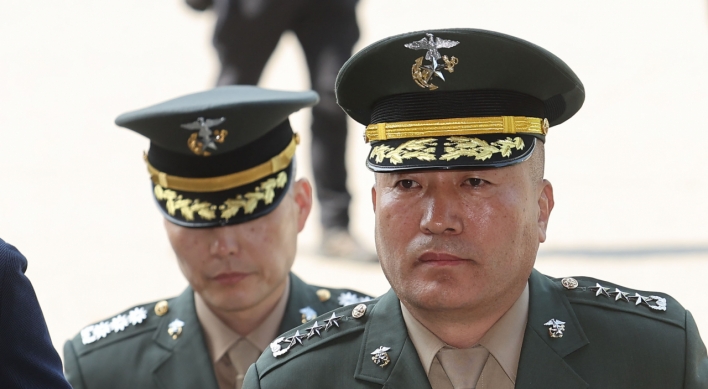S. Korea's new finance minister cautious on adopting Tobin tax
By 김영원Published : March 23, 2013 - 13:45
South Korea's new finance minister said Saturday that it needs to be cautious of adopting the so-called Tobin tax, indicating that such a measure could trigger a capital outflow.
The South Korean government said earlier that the country may move to tighten its regulation on capital flows in and out of the country amid worries that growing volatility in the currency market could hurt the country's overall economic stability.
As part of the new measures, the government said it is considering introducing taxation on foreign currency transactions, called the Tobin Tax, in order to ease market fluctuations caused by an infusion of hot money.
"We need to discuss more whether to strengthen existing measures, or introduce a new step," Hyun Oh-seok told reporters.
"When we formulate new measures, we should keep in mind their side effects," he said.
Financial market stability is a major cause for concern for the Korean government, which has experienced economic crises caused by financial market meltdowns.
Since 2010, Korea has implemented a set of the so-called macro-prudential measures to ease volatile cross-border capital flows, including bank levies and tighter regulations on banks' foreign exchange (FX) derivatives positions.
Late last year, the government announced that it would lower the ceiling of FX forward positions held by local and foreign banks by 25 percent amid the local currency's gain and said that it would take further actions if needed.
The finance minister also worried over the weakness of the Japanese yen, saying that a set of economic policies to be revealed next week include measures to help boost local exporters' competitiveness in overseas markets.
Hyun signaled that the government may trim its growth outlook for the year, adding that revised estimates will be revealed next week.
"Given the current trend, this year's economic growth rate may be lower than previously estimated," Hyun said. "That's why we are working on economic recovery measures."
In December, the government trimmed the growth estimate for Asia's fourth-largest economy to 3 percent from 4 percent citing weak domestic and overseas demand.
The Bank of Korea, the country's central bank, also cut its growth estimate to 2.8 percent from 3.2 percent.
As to calls for deregulations on the local property market, Hyun said his ministry would take all macrcoeconomic polices into account.
"The property market is not the only factor in mapping out economic policies," Hyun said, signaling that current regulations on home purchases would be maintained for the time being.
The local property market has taken a dive in the past few years, forcing some mortgage holders to auction off their property.
The bulk of banks' mortgage loans in South Korea are tied to the loan-to-value ratio (LTV), a gauge used by banks to determine the amount of a home-backed loan approvable based on the price of the house. The ratio varies with cities but the average is 50 percent for Seoul and the metropolitan area, and 60 percent in rural regions.
Local banks' household loans, including home-backed and credit loans, amounted to 459.3 trillion won as of the end of August, up 1.5 trillion won from the previous month, according to the Bank of Korea. Of the figure, the mortgage lending stood at 311.6 trillion won as of end-August.
(Yonhap News)
<관련 한글 기사>
현오석 "토빈세 도입 신중해야"
LTV·DTI 완화에도 '신중'…엔저 돌파 수출경쟁력 대책 추진
"한국경제 성장세 예상보다 떨어져"…올 성장전망 하향 시사
현오석 경제부총리 겸 기획재정부 장관은 23일 토빈세 도입에 신중해야 한다는 뜻을 밝혔다.
현 부총리는 이날 성남시 분당 한살림 생협을 방문한 자리에서 외환시장 안정을 위한 추가 조치를 하느냐는 기자 질문에 "지금의 (거시건전성) '3종 세트'를 강화하 는 장치가 필요한지, 새로운 장치가 필요한지 논의를 더 해야 한다"고 말했다.
그는 "(기자 질문이) 토빈세를 염두에 둔 것 같은데, 제도를 만들 땐 그 제도를 만들 동기가 되는 현상만 봐선 안 된다. 반대 현상도 있을 수 있다"고 강조했다.
신중론의 배경으론 토빈세 도입 시 자본 유입이 위축될 가능성을 거론했다.
그는 "자본이 많이 들어와야 할 필요성까지 고려해 제도를 만들어야 한다. (토빈세 도입은) 신중해야 할 필요가 있다"고 설명했다.
유럽연합(EU)이 금융거래세를 검토하고 있지만, 세계적으로는 자본거래 자유화원칙을 정해 놓은 경제협력개발기구(OECD) 자본규약이 있다는 점도 소개했다.
OECD 회원국은 자본 자유화에 동의한 상태인데 외환거래세인 토빈세를 도입하면 자본 자유화에 역행할 우려가 있다는 뜻으로 풀이된다.
엔저에 대한 우려도 표시했다. 일본이 인플레이션 확대로 경기를 부양하려 하면서 원화 가치가 절상돼 수출경쟁력에 적신호가 켜졌다는 것이다.
그러면서 다음 주 발표할 경제정책방향에서 엔저를 고려한 수출경쟁력 확보 방안을 마련하고, 주요20개국(G20)에서 국제공조도 필요하다고 밝혔다.
부동산 규제 완화에는 유보적인 태도를 보였다.
현 부총리는 주택담보대출비율(LTV)과 총부채상환비율(DTI) 완화 문제에 대해서는 "LTV·DTI는 부동산에 영향을 주는 정책임은 틀림없지만 큰 맥락에선 건전성에 중점을 둔 정책"이라며 "부동산만 보고 결정할 수 없다"고 강조했다.
국회 인사청문회 서면 답변에서도 해당 규제에 대해 "가계부채 수준을 생각할 때 완화 문제는 신중할 필요가 있다"고 밝힌 바 있다.
생애 최초 주택구입에 대해 취득세를 면제해주자는 제안에는 "좀 더 협의가 이뤄져야 하고 확정되지 않았다"고 말했다.
경제정책방향에서 올해 경제성장률 전망치(3.0%)를 수정하느냐는 질문에는 "성장률이 예상보다 떨어지고 있다"며 "재정과 금융을 포함해 종합적인 경기회복대책이 필요하다"고 말했다.
10조원 규모의 추가경정예산 편성에 대해서는 "폴리스 믹스에선 어떤 정책이 다른 정책의 강도에 따라 달라질 수 있다"며 편성 규모가 달라질 수 있음을 시사했다.
정책조합에 대해선 "금리 정책, 엔저와 관련한 수출산업 지원책 등 여러가지가있다"며 "정부 영역 외에 금융통화 영역도 있을 수 있으니 종합적으로 봐야 한다"고 설명했다. 경기 부양 수단으로 통화정책의 활용 가능성을 시사한 것으로 풀이된다.
한편, 현 부총리는 이날 새벽 서울 가락동 농수산물도매시장을 방문해 과일과 명란젓 등을 직접 구매하며 농수산물 가격동향을 점검했다.
이어 아침식사에서 도매시장 지원을 확대해달라는 상인들의 요청에 "유통구조 개선 태스크포스(TF)에서 개선 방안을 찾겠다"고 말했다.
그는 자택 인근의 분당 한살림 생협 매장도 방문했다.
매장에서 생협 예비조합원으로 가입한 그는 "대형마트와 골목상권 이야기가 많이 나오는데, 협동조합은 생산자와 소비자가 '윈윈'할 수 있는 형태"라며 협동조합 강화 방안을 찾겠다고 약속했다.
여신전문금융업법 개정으로 협동조합 매장의 카드사 수수료율이 높아졌고, 협동조합이 취득세 납부 때문에 어려움을 겪고 있다는 호소에는 공정거래위원회, 금융위원회, 기재부 세제실 등과 협의해보겠다고 답했다.


















